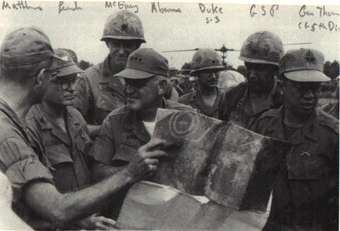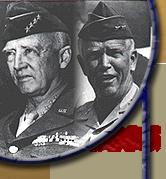|
|
 |
|
|
Reviews: The Wall Street Journal - Blackhorse Veteran’s
|
The Wall Street Journal Review
by Mark Yost
|
Brian Sobel’s The Fighting Pattons is an extraordinary history of one American family’s love of war. It includes
the exploits of Hugh Mercer, a famous Revolutionary War general who married into the Patton line, and Col. Waller
Tazewell Patton, who was mortally wounded at Gettysburg while taking part in Pickett’s Charge.
But the focus is
on the careers of the 20th-century Pattons, World War II legend Gen. George S. Patton Jr. and his lesser-known
namesake and son, Major Gen. George S. Patton who fought in Korea and Vietnam and now lives quietly on the family
farm in Hamilton, Mass.
Major Gen. Patton’s life and thoughts give us insights into more his more famous father that can only come from
a son forced to live and work in a great man’s shadow. But he is in interesting figure in his own right.
Not surprisingly, we learn that the son wanted to be a soldier for as long as he can remember. What perhaps is
surprising is how he carved out his own distinguished 30-year career in the Army, where his very name raised expectations
and sometimes bred resentment. Despite these obstacles, he actively sought tough assignments in which he could
prove himself. And he insisted on being assigned to combat units in both Korea and Vietnam after first being offered
rear-echelon staff positions.
One can’t help seeing the shadow of his father’s love of military pomp and protocol when the younger Patton salutes
a Viet Cong soldier following a particularly fierce battle. “Later the media said I had honored this VC by
saluting him,” Major Gen. Patton says. “I still see nothing wrong in my action. He had shown me his ability
as a soldier, and I was saluting him as my honorable enemy whom I had succeeded in conquering.”
 Father and son also clearly share the same sense of history and respect for the time-honored tradition of soldiering. Father and son also clearly share the same sense of history and respect for the time-honored tradition of soldiering.
During Cold War duty in Europe, the younger Patton relates how he got shivers at the idea that the defensive position
he was commanding on the German-Czech border was along a trench line dug by Roman legions stationed there around
A.D. 44.
And this most conventional warrior’s view on that most unconventional war, Vietnam, makes for good reading. “We
were in total violation of surprise, simplicity, command and objective,” he says of U. S. strategy in Vietnam.
“Somewhere someone made the statement that we would not go above the seventeenth parallel with land forces. We never should have told them that, we should have let them worry. Most importantly, we should have taken Vietnam
on as a theater of war just exactly like the Italian theater or the Mediterranean or South Pacific or Central Pacific
theaters. We should have drawn a circle around Southeast Asia.”
His father couldn’t have said it better.
|
|
|
HOME · THE AUTHOR · EXCERPTS · REVIEWS
PHOTO GALLERY · WHAT OTHERS SAY
BUY THE BOOK · CONTACT INFO
|
|


 Father and son also clearly share the same sense of history and respect for the time-honored tradition of soldiering.
Father and son also clearly share the same sense of history and respect for the time-honored tradition of soldiering.